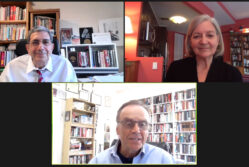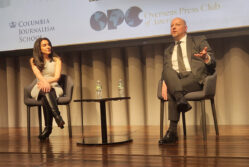Event Coverage Highlight

Correspondents in Paris Say Many World Leaders Relieved After Macron Reelection
by Chad Bouchard
The French election ended with a runoff on April 24 with Emmanuel Macron taking more than 58 percent of the vote over far-right candidate Marine Le Pen and becoming the first French leader to be reelected in 20 years. For many, including those in the U.S. White House and across the European Union, the outcome was a relief after the looming prospect of disruption that a nationalist Le Pen presidency might have caused.
On April 26, the OPC and the American Library in Paris co-hosted a panel of journalists in Paris to discuss the results. The moderator was OPC Past President David A. Andelman, who is a CNN columnist, a former CBS News Paris correspondent, and an author.
Andelman asked Sarah Paillou, presidential campaign reporter for the Journal du Dimanche, about the status of the far right in light of this loss. She said there will be many local elections across the country before the next presidential election, and those contests serve as a test for Le Pen and her supporters.
She said though Le Pen wasn’t very visible as a political figure over the last five years, “she managed still to increase her influence in the country. So it’s very difficult to fight an enemy that doesn’t speak, or not much.”
Andelman added that she only has six members out of the 577 in the National Assembly, and will face an uphill battle if she wants to form a group within parliament.
Victor Mallet, the Paris bureau chief of the Financial Times, said that despite concerns about the rise of the far right, Macron won the election handedly, and that opens the door for him to push his agenda and take on a role as senior statesman within the European Union, particularly after German Chancellor Angela Merkel stepped down last year.
He said with 60 percent of the French electorate voting either far right or far left in the first round of the election on April 10, the country is under siege by anti-internationalist, nationalist and sometimes populist movements that have already taken hold in the U.S. and U.K.
“There aren’t many remaining democracies that are centrist and liberal left in the world, now,” he said. “All around the world you’ve seen democracies fall under the control of authoritarian or in some cases dictators, Russia being the most obvious example, but the same has happened in Brazil, the Philippines and Turkey and so on.”
Nadia Pantel, chief Paris correspondent for Süddeutsche Zeitung, said Macron’s reelection was “very good news” for Germany.
“France is Germany’s closest partner, and if Marine Le Pen would have won there not only would be a Putin ally at the Élysée Palace, but also somebody who has very strong anti-German rhetoric.”
Vivienne Walt, an OPC Governor and Paris correspondent for TIME and FORTUNE, said many leaders welcomed news about the election results.
“You could hear the sighs of relief from Paris to Brussels and all the way to Washington. The sense of relief in the White House must have been quite overwhelming, because the alternative would have been really disastrous.”
She said it would have amounted to a reversal of what France suffered through under Trump for the last four years. Walt said Macron can find his footing again with the U.S. now, without the specter of the reelection fight looming, and will be in a key diplomatic position on the doorstep of Ukraine with good relations with President Volodymyr Zelensky.
Watch the entire program via the window below.



